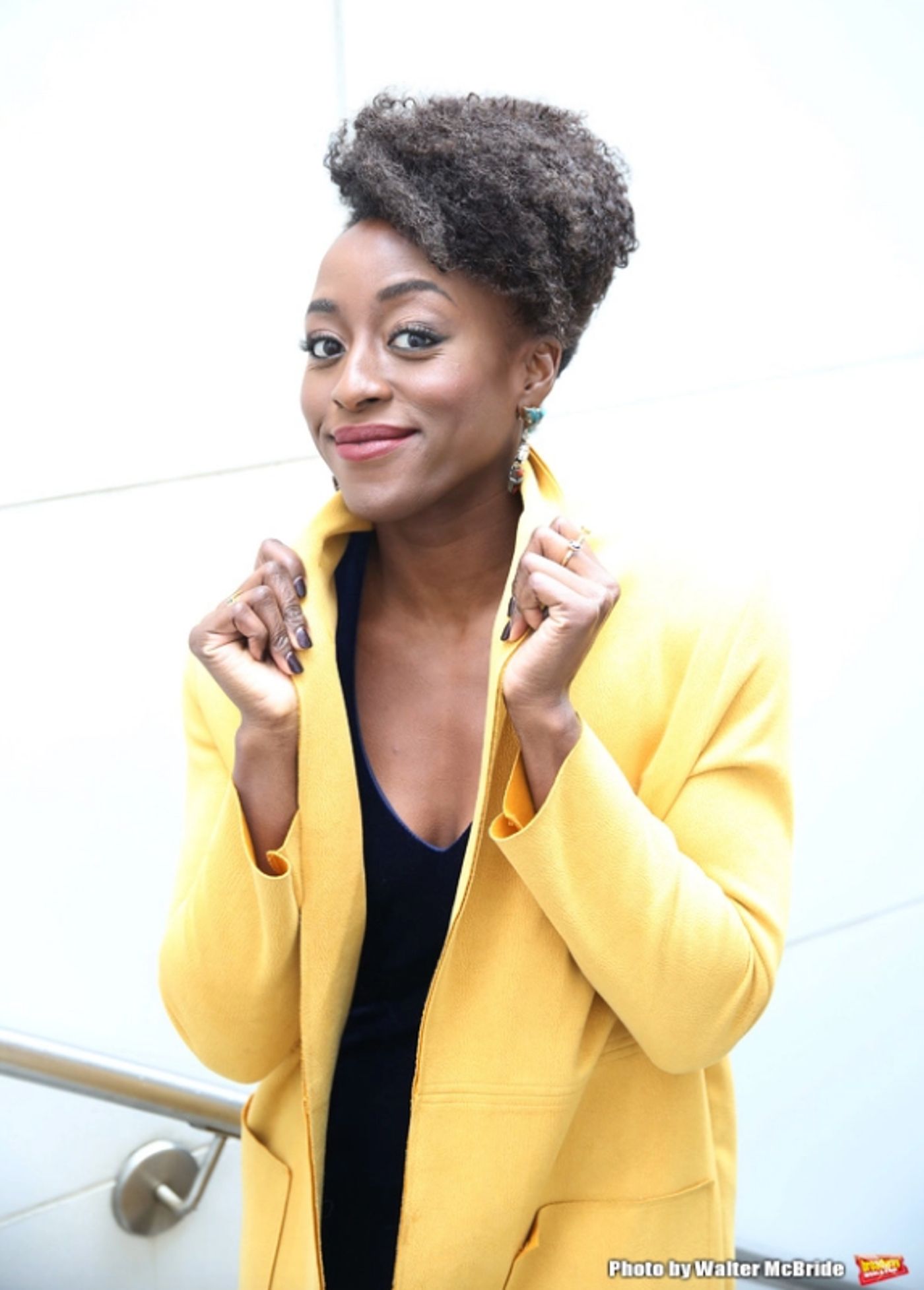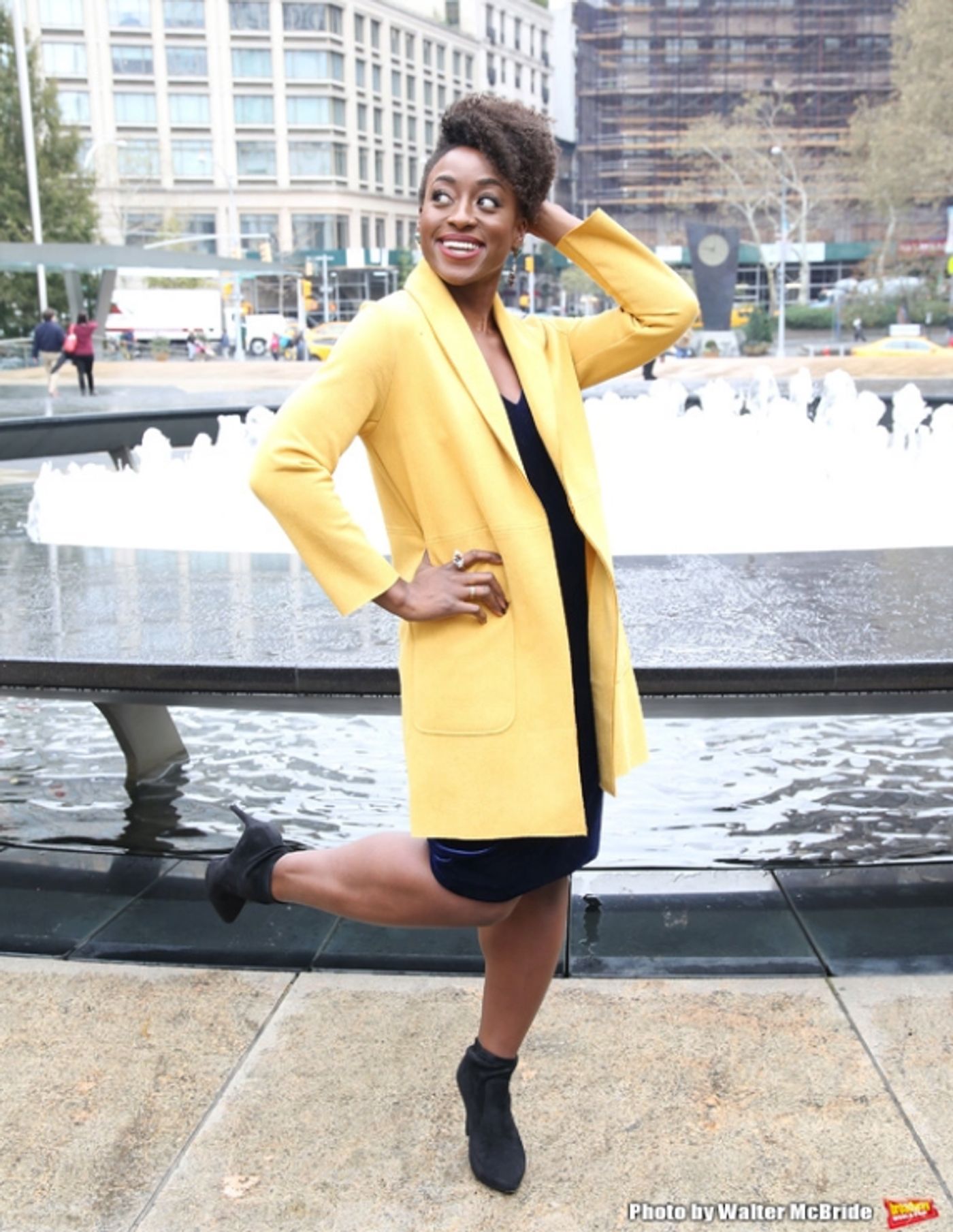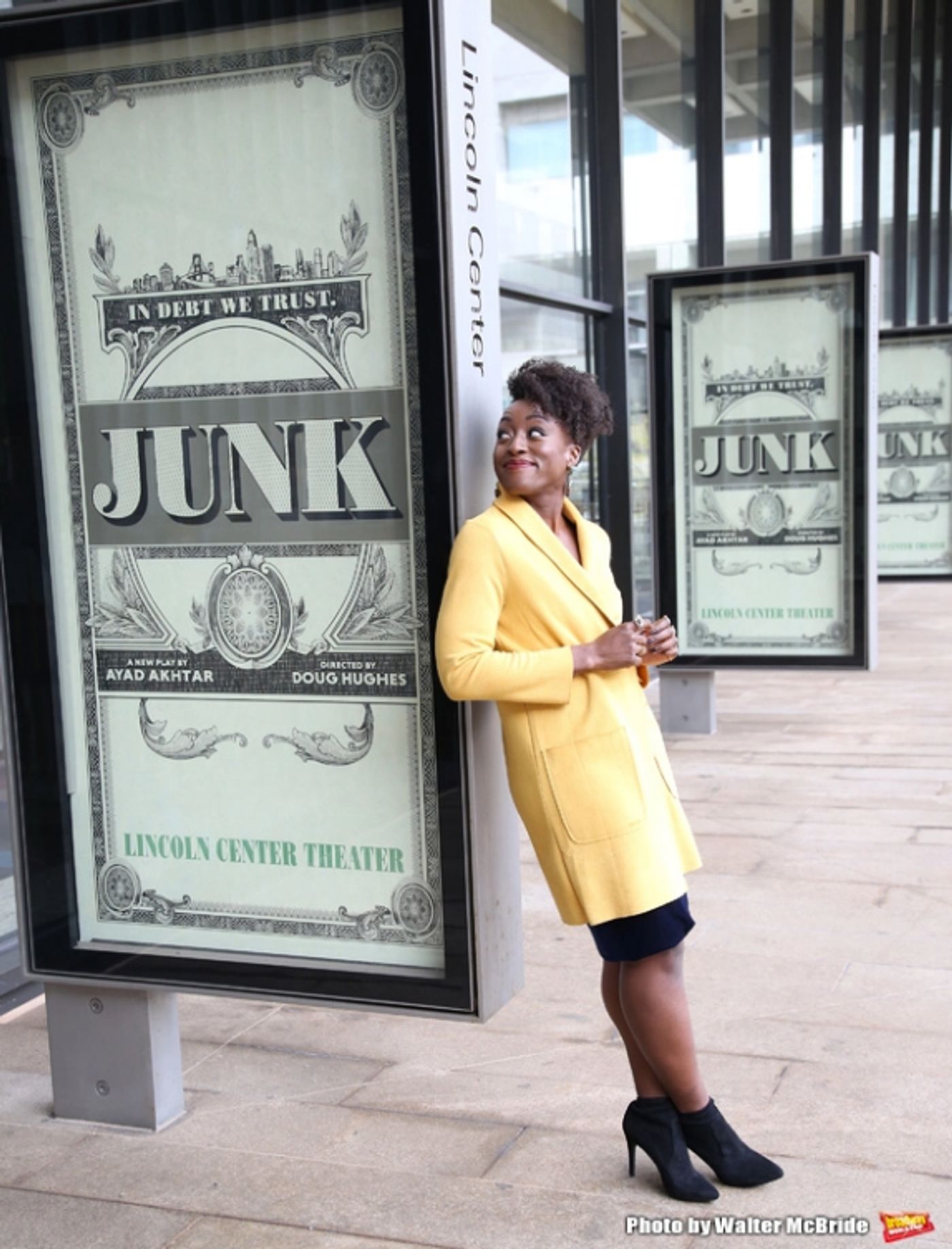Exclusive BWW Interview - Debut of the Month - JUNK's Ito Aghayere
 In Ayad Aktar's new play Junk, Ito Aghayere makes her Broadway debut as Jackie Blount, a 28-year-old year-old financial wiz who finds herself caught up in the wheelings and dealings of the financial world of the 1980's. The riviting story is inspired by the real Junk bond kings of the day, and shows us from the inside how money became the only thing that matters. Directed by Tony winner Doug Hughes, the play is a no-holds-barred portrait of the dark side of the American Dream.
In Ayad Aktar's new play Junk, Ito Aghayere makes her Broadway debut as Jackie Blount, a 28-year-old year-old financial wiz who finds herself caught up in the wheelings and dealings of the financial world of the 1980's. The riviting story is inspired by the real Junk bond kings of the day, and shows us from the inside how money became the only thing that matters. Directed by Tony winner Doug Hughes, the play is a no-holds-barred portrait of the dark side of the American Dream.
Today, Ito Aghayere speaks with BWW about her Broadway debut and explains why she remains a pragmatic optimist, despite the play's bleak depiction of the financialization of America.
[NOTE: BroadwayWorld's fabulous photographer Walter McBride captures images of the Broadway stars profiled in our monthly column in a special photo shoot. Check out the pics of Ms. Aghayere throughout the feature!]
There are so many important messages to glean from this play. Do you think it paints a pessimistic view of where our country is heading?
Well I am a pragmatic optimist, so in many ways for me, the optimism lies in finding a way forward and finding a next step. And I think that this play doesn't leave you feeling powerless. It leaves you with a choice of whether or not you will inform yourself of the nature of the financialization of America or whether you'll chose to be blissfully unaware or ignorant. And I think that's what gives me optimism - that there is a choice of whether or not I will educate myself, whether or not I will be informed. And I hope  that the audience gets that sense of pragmatic optimism as well.
that the audience gets that sense of pragmatic optimism as well.
While the show is a period piece set in the 1980's, it's remarkable how relevant it is to today's world.
Absolutely. And this is why Ayad wrote this play. Because it represents the moment in our collective history when the scale was tipped irrevocably towards monied interests. And I think it represents an origin play in some ways, the genesis that created what we are seeing now. We talk about politics and Republicans and Democrats, and I believe that at the heart of this play is an uncomfortable truth, which is that it is not a political problem we are dealing with, it's is a money problem. It's a problem of who has had the money, who has the money and who will never have the money and therefore will never have power. And so it really goes beyond political parties. This is about the rise of the anti-establishment rubric that we've seen on both the left and the right. And it has to do with this gross inequality that we see in our world today, this two-tiered system where we see money driving every decision. Every decision is a choice between the bottom line or nothing. There is no collective good anymore. You know welfare is now a pejorative term, when in the 1940's it was deemed as what the government was supposed to do. Now we look at government as the people with power who take our money. So things have changed drastically. The financial sector has taken over every aspect of the way we live. And I think this play speaks to the danger of letting that become the way we think.
 But you believe it's not too late to turn things around.
But you believe it's not too late to turn things around.
I think so. It's hard, you know I am no millionaire, that's for sure. I do not have the kind of wealth that would give me the power that Warren Buffet or Oprah have. But where the optimism can come in is the realization that if we collectively educate ourselves as to what the financial industry is trying to do, which is to turn us into uninformed consumers of Junk, of goods that we don't need, if we could be aware of that, then together we can upend the system. And once we are informed of how insidious it has become, how deeply intrinsic it is to the way that we live, then we can start collectively talking about how we change the way we live our lives. But again, it only starts with educating ourselves about it.
What about your character, Jackie. Do you see her as a victim of the system or a willing participant?
Well the first thing I always try to do when I read a character off a page is not judge her moralistically. And one of the reasons I love Ayad's work, especially in this play, is that you often find yourself agreeing with the last person who spoke. And that is because they are able to justify, validate and rationalize the choices that they made, however unethical they may seem. And I think that is what I find so interesting about playing Jackie. I can understand her plight. I can understand her desire for more. And I can understand her inability as a black woman in the 80's to do that in the ethical way, and her inability to be fine with waiting to be given a chance. So  I can understand the tension there, between demanding what you believe you deserve as a competent, educated minority woman in that industry that was filled with sharks. I understand her desire and her resolve to do whatever it takes to get to the top. And I can also sympathize with her. I don't think that she's a victim, I think she is a willing member who decides to buy into the system that she realizes she's a part of. And in the buying in of that, she wants to get her part, she wants to get her piece of the action so she can have a seat at the table. So I understand that drive, that pull.
I can understand the tension there, between demanding what you believe you deserve as a competent, educated minority woman in that industry that was filled with sharks. I understand her desire and her resolve to do whatever it takes to get to the top. And I can also sympathize with her. I don't think that she's a victim, I think she is a willing member who decides to buy into the system that she realizes she's a part of. And in the buying in of that, she wants to get her part, she wants to get her piece of the action so she can have a seat at the table. So I understand that drive, that pull.
It's funny with this play because it's taking me back to freshman year and the Political Science coursework that I did undergrad. You know Adam Smith, 'Wealth of Nations', he described a world in 18th century England, and one of the things he said is that when you are an architect of a society, you actually run that society. So at the time he was speaking of the merchants and nobles. Now, it's the financial industry - it's CEO's, it's multi-million dollar conglomerates. They have cracked the society that they are in and it has served their interests. So Jackie understands who the architects of her world are. She understands who the titans are, and she wants to be one. And I think she realizes that in some ways, she has to play the game.
You mentioned your undergrad work as a Political Science major. That is a unique resume credit for an actor.
 Well I have to say, what got me into both politics and theater was that both involved storytelling. And ever since I was a kid, I've always been fascinated by the stories that are not told, or the lengths people use narratives to shift ideas and opinions and preferences. I've just always been fascinated by that and I think in some ways, that's what drove me to politics as well as into theater, and writing and storytelling. Because ultimately in my mind, the way I see politics is the crafting of narratives. I think some of the greatest politicians who I admire were able to tell stories about marginalized people or issues that a lot of people didn't know about. But they were able to use stories and narratives to make it relevant, to galvanize people to do something. And I think stories, in and of themselves, have the power to compel people to do something, to act, to change, to think about something differently. And that's why it's such a privilege to be part of this play, which is not only brilliantly written and brilliantly directed in my opinion, but is also so relevant and speaks to the world that we currently live in.
Well I have to say, what got me into both politics and theater was that both involved storytelling. And ever since I was a kid, I've always been fascinated by the stories that are not told, or the lengths people use narratives to shift ideas and opinions and preferences. I've just always been fascinated by that and I think in some ways, that's what drove me to politics as well as into theater, and writing and storytelling. Because ultimately in my mind, the way I see politics is the crafting of narratives. I think some of the greatest politicians who I admire were able to tell stories about marginalized people or issues that a lot of people didn't know about. But they were able to use stories and narratives to make it relevant, to galvanize people to do something. And I think stories, in and of themselves, have the power to compel people to do something, to act, to change, to think about something differently. And that's why it's such a privilege to be part of this play, which is not only brilliantly written and brilliantly directed in my opinion, but is also so relevant and speaks to the world that we currently live in.
What has it been like to work with this stellar creative team?
It's been phenomenal. Ayad [Aktar] and Doug [Hughes] work in such a collaborative  way, unlike any creative partnership I've seen, to be completely honest. The way that they work with us as a cast, it's humbling. They bring their ideas, they bring their research and they bring opinions on the way forward in regards to what to do with the play, how to craft the play, how to shape the play. They bring all that to the table. But they bring it with such a level of humility. And what I get from them is this idea that while they have their own thoughts, they also have this understanding that there are other people in the room, other collaborators that may come up with things that they can't. So they are always ready to receive, they always have that expectation that there are ideas that maybe I will have that they don't have, that I may bring something to the table that is just as valuable. So they are always ready to collaborate in such a humbling way. And they really created this incredible family, this incredible community in this intimate space in which we worked. These things that we're talking about, finance and money, they can become very granular and we had to get to the root of things, we had to get to that emotional layer of desire and self-worth and failure and triumph. We had to get to the root of all these things that are actual motivating factors behind whatever we do with money. And it helped in so many ways to have creators in the room, leaders who were willing to be in discussion about our response to the play as the actors who are playing these people. So that's just one of many remarkable aspects of working with them.
way, unlike any creative partnership I've seen, to be completely honest. The way that they work with us as a cast, it's humbling. They bring their ideas, they bring their research and they bring opinions on the way forward in regards to what to do with the play, how to craft the play, how to shape the play. They bring all that to the table. But they bring it with such a level of humility. And what I get from them is this idea that while they have their own thoughts, they also have this understanding that there are other people in the room, other collaborators that may come up with things that they can't. So they are always ready to receive, they always have that expectation that there are ideas that maybe I will have that they don't have, that I may bring something to the table that is just as valuable. So they are always ready to collaborate in such a humbling way. And they really created this incredible family, this incredible community in this intimate space in which we worked. These things that we're talking about, finance and money, they can become very granular and we had to get to the root of things, we had to get to that emotional layer of desire and self-worth and failure and triumph. We had to get to the root of all these things that are actual motivating factors behind whatever we do with money. And it helped in so many ways to have creators in the room, leaders who were willing to be in discussion about our response to the play as the actors who are playing these people. So that's just one of many remarkable aspects of working with them.
 What a wonderful experience that must have been.
What a wonderful experience that must have been.
Yes. I feel spoiled to be completely honest!
What was it like to make your Broadway debut in this show?
It was a bit surreal actually. And it still is. There are moments where I still feel like I can't believe I get to do this show, this show that means so much to me. Because as an actor, there are many pieces that you work on that may not resonate as much, or resonate to a lesser degree. Like I said earlier, it's just been such a unique experience to be a part of a play that engages both sides of my brain and calls on all of my experience, my degree in politics as well as my love of storytelling. Good stories, that happen to coincide with what's going on in the real world, have an almost magical quality of being able to pierce through to that thing that we can't even name, that profound trouble that we feel in the world sometimes but can't seem to put into words. And I think that being a part of a play that does that, that I believe did that for me when I read it, before I even knew that I got the role, is quite a privilege. And it almost feels like my civic duty to do it.

BWW congratulates Ito Aghayere on her Broadway debut in Junk! Her off-Broadway credits include Danai Gurira's Familiar (Lucille Lortel nomination; Playwrights Horizons); The Liquid Plain (Signature); Three Days to See (New York Theatre Workshop); The Tempest, Much Ado About Nothing, and Macbeth (Classic Stage Company). Her film credits include Logan Lucky (dir. Steven Soderbergh), and Goldie. TV credits include "Instinct," "The Blacklist," "Elementary," "Doubt," "Master of None," "Braindead," "The Knick," "Orange Is the New Black," "Unforgettable," and "Forever."
Videos

